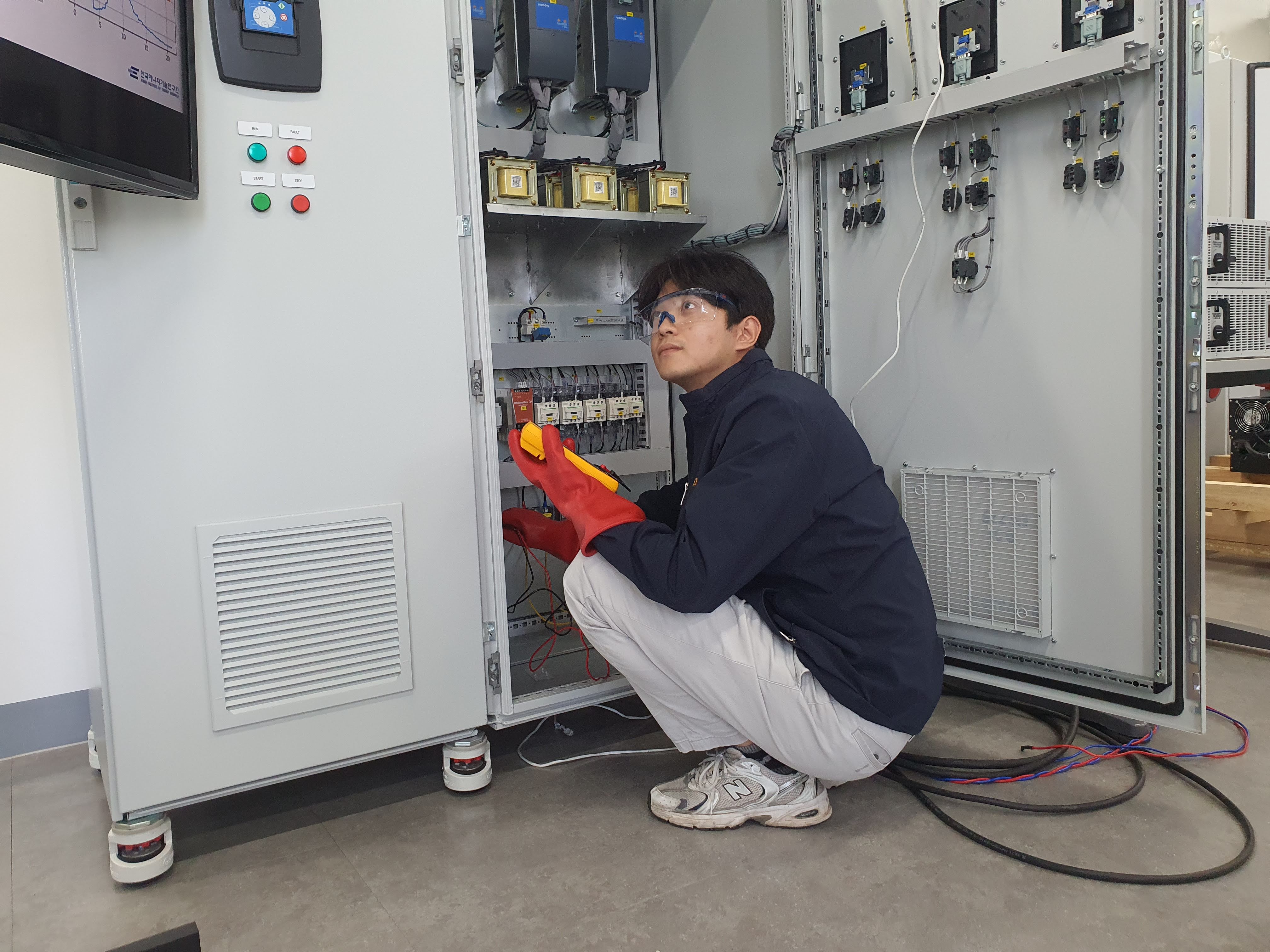KIER STORY
- Date
- 2023-08-11
- Views
- 3,314
SCI Convergence Research Group Student Researcher (Doctor) Kim Ki-hoon
The 12th student researcher is Kim Ki-hoon, a student researcher who received the Excellence Presentation Paper Award from the Korean Solar Energy Association.
The technology of SCADA, simulation program and power control algorithm for energy convergence system operation control, patent and know-how technology for electric vehicle charging system technology were transferred, and four patent applications were filed.
1. Please introduce yourself and introduce this excellent paper.
Hello, I am Kim Ki-hoon, a student researcher who is studying and researching at the power system research team of the Jeju Global Research Center of the Korea Energy Technology Institute.
We are interested in developing a fundamental solution to the acceptability of distributed power and renewable energy resources using power and electronics technology, and are currently participating in research on virtual power plants, sector coupling, and energy system integration.
While participating in the research project, I was able to contribute to winning the Korea Solar Energy Association's Excellent Presentation Paper Award and transferring technology to related fields.
This paper is about how to operate various energy sources to integrate complex energy systems to increase energy independence while expanding the acceptability of renewable energy, and will expand to the subject of future doctoral thesis.
2. How did you start your research?
After a master's degree at Jeju National University, I learned that power electronics is an important technology for expanding the system acceptance of new and renewable energy and can provide various options for operating new and renewable energy.
While conducting research at the Korea Institute of Energy Technology, I thought that the most economical and stable way to solve problems caused by the supply of new and renewable energy is through a combination of various energy sources and proper operation.
3. Was there any difficulty in writing the thesis?
Currently, the subject of R&D with the guidance doctor is the integration of complex energy systems, and there were two difficult parts.
The first is to implement simulations, which are theoretical models that can interpret various scenarios for integrating complex energy systems, and the second is to make and verify the integrated controller of complex energy systems in hardware. From the perspective of electrical engineering, it was difficult to create theoretical models for heat, fuel, etc., so with the help of doctors conducting related research, we were able to understand the characteristics of the model and develop models for simulation.
We were able to complete the model based on cool-headed analysis and advice from relevant doctors on the simulation results of various scenarios. In the second stage, it was difficult to come up with a way to incorporate theoretically developed composite energy characteristics into the hardware by manufacturing and testing them with hardware. With the help of related doctors, we used the test data of the actual equipment and produced a simulation device so that the characteristics of individual complex energy can be implemented. Based on this, we were able to develop a GUI program using Python and verify the performance of the target control system.
4. How did you come to Korea Institute of Energy Technology?
In January 2021, I was able to have an opportunity to have a meeting with Dr. Ko Hee-sang, the advisor, in the office of the advisor at a time when I was unable to make up my mind at the two crossroads of continuing my studies and starting my social life after my master's degree.
During the interview, I was able to have an indirect experience of the research environment and infrastructure of the Jeju Global Research Center of the Korea Institute of Energy Technology. In particular, after hearing the vision of integrating complex energy systems, I decided to challenge with my advisor.
5. Is there anything memorable while staying at the Jeju Center?
I remember being pointed out by doctors every time about how to gain expertise during the research process. My opinion is also considered to be a trial and error of a junior researcher, and I am grateful for the generous opportunity to listen and implement it.
Right now, I'm also waiting for the advice of doctors, thinking that it's my job to handle. The explanation and sharing of the materials prepared by doctors are an important asset in securing expertise, and I think that the part you always treat me as an expert is also very helpful in establishing my researcher personality.

6. Is there anything you want to do or research in the future?
In order to achieve the carbon neutral policy of the state or local governments, we were interested in the integration of complex energy systems that optimally combine and operate various resources stably, and we are currently conducting related research with doctors. First of all, we would like to focus on research and development that can increase the energy independence rate along with the issue of output restrictions on Jeju Island.
7. What do you want to say to students
I think it is important not only to improve research capabilities but also to incorporate them well into building a personality as a researcher by giving advice from instructors and researchers who are seniors in life. If I think about common interests more than myself, my personal performance seems to pile up naturally.
